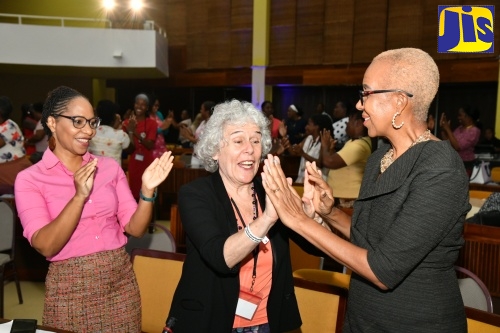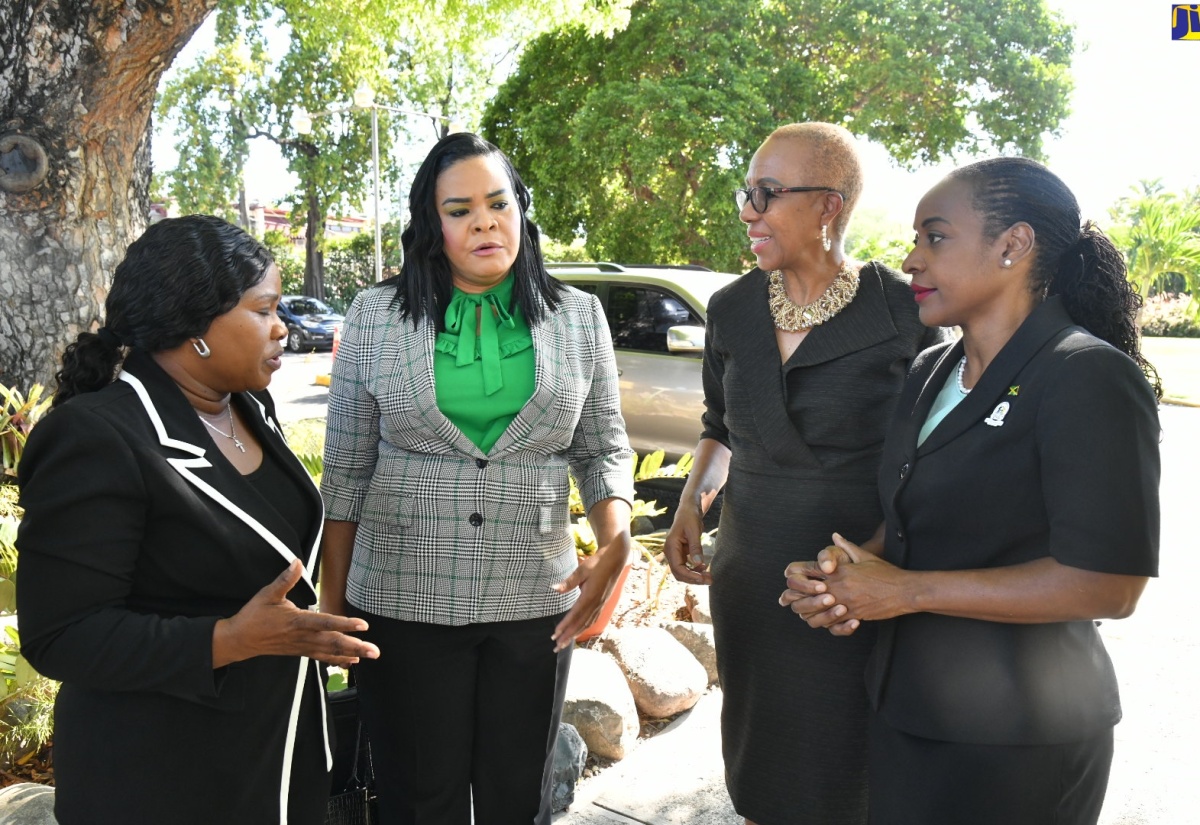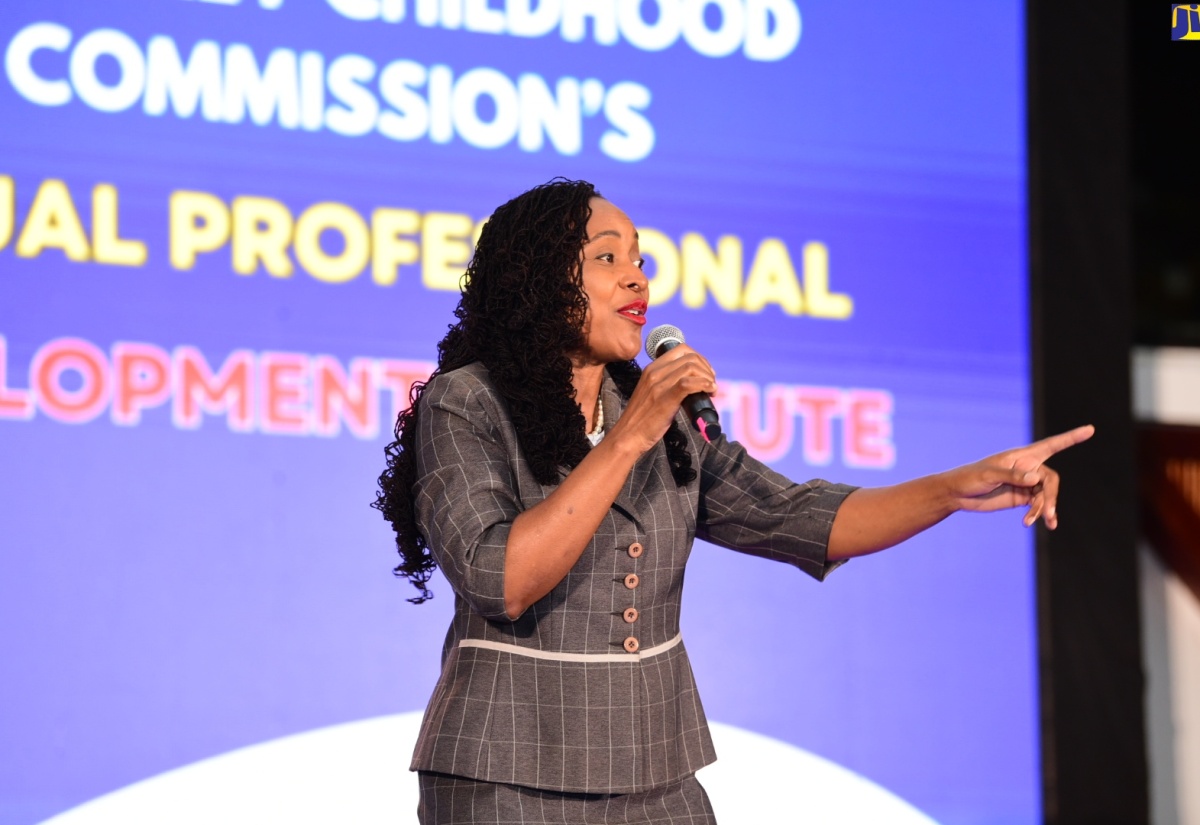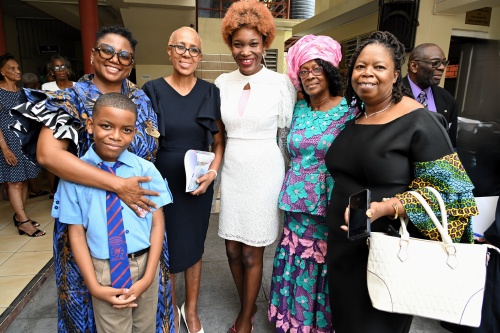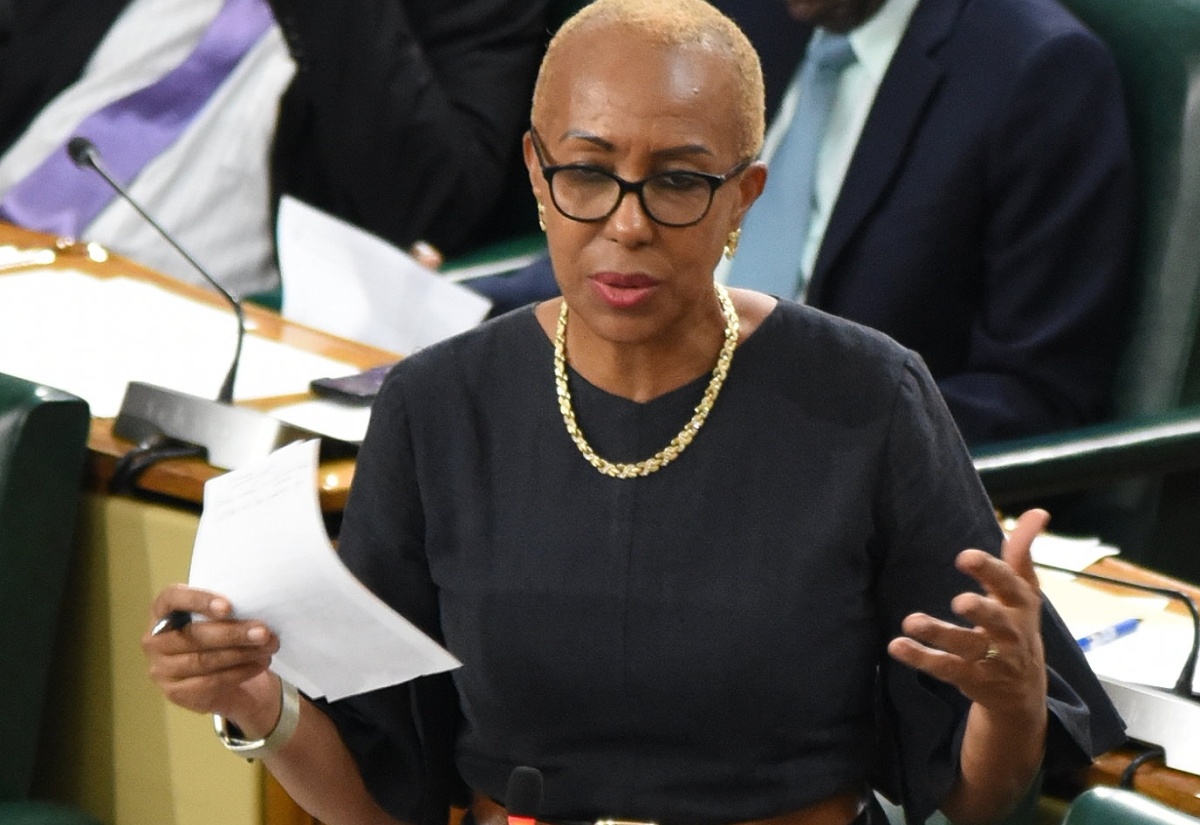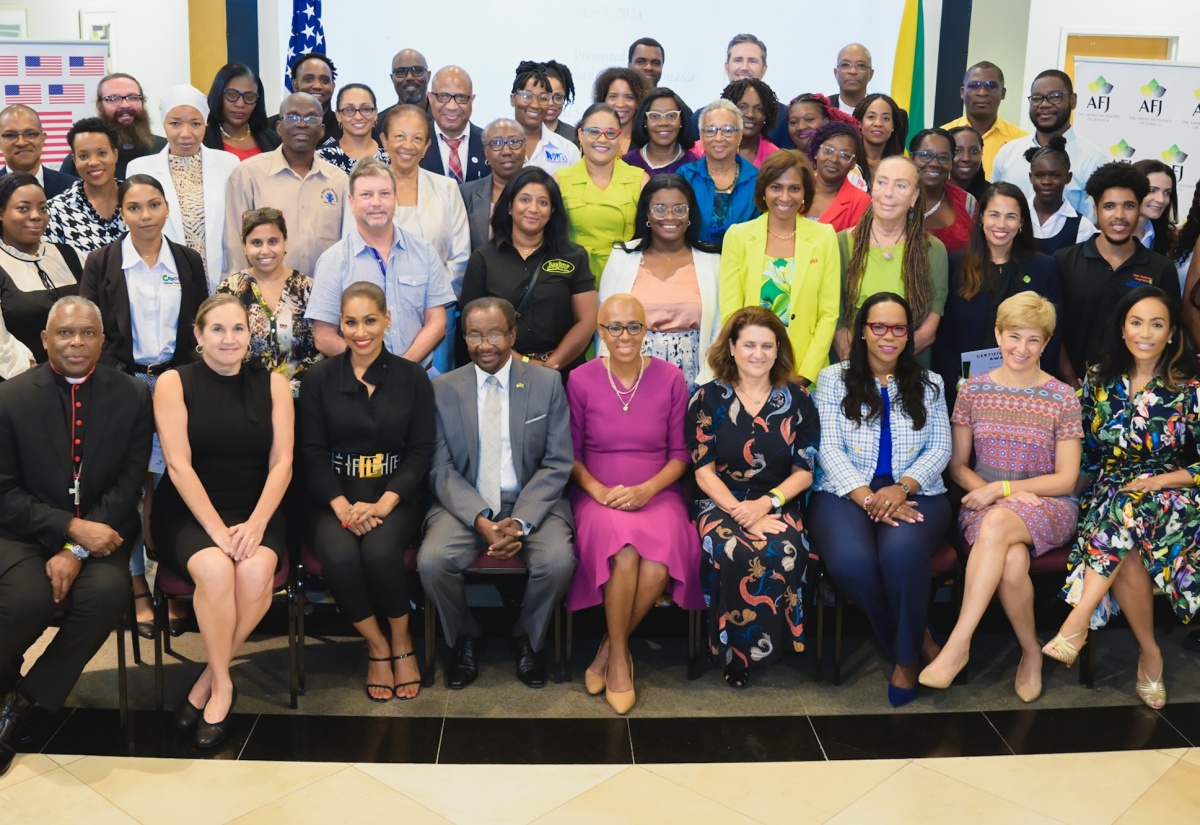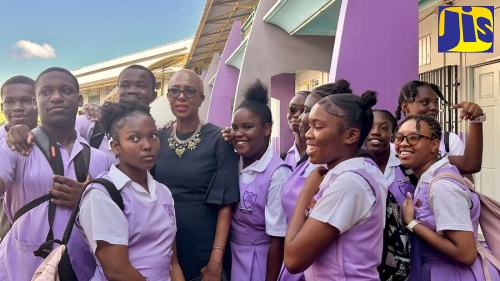President of the Jamaica Independent Schools Association, Tamar McKenzie (second left) and Registrar, Independent Schools Unit in the Ministry of Education and Youth, Sharon Hunt (second right), are joined by various stakeholders at the launch of the Jamaica Independent Schools Association Preparatory School Champs on Friday, May 31, at the Ministry in Kingston. From left are General Manager of GraceKennedy Insurance, Chaluk Richards; Sts Peter and Paul Preparatory School representatives – students Anya Johnson, Coach Jerome Kirby and student Donovan James; and General Manager of GraceKennedy Mutual Funds, Daniel Thompson.
Category: Uncategorized
Students Urged to Steer Clear of Tobacco
Students are being urged to resist tobacco amid the pervasive use of vapes or e-cigarettes among youth.
State Minister in the Ministry of Education and Youth, Hon. Marsha Smith, said tobacco usage has the potential to take as many lives as the COVID-19 pandemic did.
She likened the COVID-19 pandemic to tobacco on steroids, as she implored students to find other ways to enjoy recreational time without using tobacco products.
“Every time you see a tobacco product, whether it is the traditional tobacco product or e-cigarettes, I want you to remember what COVID did to the world and say to yourself ‘if COVID did so much to the world and destroyed so many lives and took away so many important people from our lives, it’s the same thing that tobacco is doing right now,” Ms. Smith said.
She was addressing the opening ceremony of World No Tobacco Day (WNTD) Youth Forum and Exhibition at Pembroke Hall Primary School in Kingston on Friday (May 31).
It was held under the theme ‘Protecting Children from Tobacco Industry Interference: Tobacco Free Future’.
In her remarks, Acting Pan American Health Organization (PAHO)/ World Health Organization (WHO) Representative in Jamaica, Dr. Audrey Morris, said it is critical for youths to be empowered, so that they can demand that the tobacco industry seizes from targeting them with harmful products.
Dr. Morris shared that vaping is surging among young people globally, noting that the 2017 World Youth Tobacco Survey revealed that 11.7 per cent of Jamaican students between the ages of 13 and 15 years were using e-cigarettes.
“That was 2017, so by now we think it is more. Use of these devices can seem like fun or seem harmless, but it is risky for your health. It can affect your memory, concentration, learning, self-control, and your mood, so it makes it harder to focus on school and other activities,” she said.
Dr. Morris encouraged students to protect their bodies and their futures by saying no to tobacco.
For her part, Chief Technical Director in the Crime Prevention, Rehabilitation and Inspectorate Policy Division of the Ministry of National Security, Shauna Trowers, said the government is committed to the safety and security of youths, a critical component of which is shielding them from the harmful influences of tobacco.
She shared that students have been increasingly targeted through exploitative marketing tactics, aiming to hook a new generation on harmful products.
“The government has already taken steps to combat this issue and we have created a ban on tobacco advertising on domestic television and radio and there are restrictions on outdoor advertising and brand marketing,” she said.
Ms. Trowers urged students to steer clear of tobacco and choose a healthy and vibrant future.
Students from 17 primary and secondary schools across Jamaica participated in the youth forum and exhibition.
The Jamaica Coalition for Tobacco Control, Heart Foundation of Jamaica, National Council on Drug Abuse and Jamaica Cancer Society were among the exhibitors.
Closing of ECC’s Professional Development Institute
Stakeholders Urged to Strengthen Collaboration to Ensure the Well-Being of All Children
Minister of Education and Youth, Hon. Fayval Williams, is calling on stakeholders to continue enhancing the collaborative efforts and frameworks to ensure the safety and well-being of all?children and the safe return of those who have gone missing.
“Our work is far from over. We have had successes in terms of the systems, the processes, the procedures that we put in place, but we want to get to that point where we are reporting that no child is missing, but if they are missing, we find them the same day; that’s where we would love to get to, but I know there is a lot of education needed,” the Minister said.
Mrs. Williams was speaking at the Child Protection and Family Services Agency (CPFSA) ‘Ananda Alert Conference: Strengthening Responses to Missing Children’,?at the Terra Nova All-Suite Hotel in St. Andrew, on May 24.
“We all need to feel a sense of ownership of everybody’s children and to really believe that as adults we have a part to play in protecting all of our children,” she added.
The Minister emphasised that “we must continue to strengthen our systems, forge new alliances, and adopt innovative approaches to addressing the complex and evolving challenges associated with missing children.?We know that by sharing knowledge and learning from each other, we can?build a?stronger, more resilient framework for protecting our children”.
She urged Jamaicans to stand up, speak out, and protect the rights of children, and ensure that?every child grows up in a safe and nurturing environment.
“As we gather here during?Child?Month, under the theme ‘Stand Up, Speak Out, Protect the Rights of Our Children’,?let us be reminded of our collective responsibility to advocate for and protect the rights of our children. The theme resonates deeply with our mission to focus on enhancing our strategies and sharing?best practices to ensure the safety and well-being of all?children and the safe return of those who have gone missing,” the Minister said.
She expressed gratitude to the CPFSA?for their tireless work?in?safeguarding the country’s most vulnerable children.
“Whenever a child goes missing, the CPFSA,?through?the National?Children’s?Registry (NCR),?reports and?mobilises?a national response in alliance with the Constabulary Communication Network (CCN), media houses, and various government agencies.? These partnerships are vital in ensuring a swift and coordinated?response?to increase the number of children who?are returned?home safely,?and?I?commend every one of you for your dedication and collaboration,” she said.
Chief Executive Officer, CPFSA, Laurette Adams Thomas, challenged the participants to share the information that they learnt at the function with their colleagues, family members and friends.
“Gain the necessary child-protection knowledge for yourself and then share it with whom you come in contact,” she said.
Mrs. Adams Thomas noted that every year there is an average report of approximately 1,000 missing children.
“Fortunately, and due largely to the Ananda Alert system, the majority of these cases are resolved quickly with children returning safely to their families, but there are still several other instances in which there is no safe or speedy recovery of the missing child,” she said.
She argued that everyone has a role to play in the prevention and return and recovery of missing children.
The Ananda Alert Conference facilitates a pivotal regional knowledge exchange on best practices?to strengthen?the responses to missing children.
The event is held?in observance of?International Missing?Children’s?Day 2024, which is focused on raising awareness about missing children,?emphasising?efforts to locate and reunite them safely, and?providing support to?the families.
Education Minister Participates in NCMC Children’s Day Activities
ECC Fifth Annual Professional Development Institute
Education Minister Gives Firm Commitment to the Care and Protection of Children
Minister of Education and Youth, Hon. Fayval Williams, has underscored the Ministry’s unwavering commitment to the care and protection of children.
She pointed out that the Ministry is collaborating with the Children’s Affairs Policy Division and the Child Protection and Family Services Agency (CPFSA) to increase public awareness of every child’s rights, empower children with information related to their rights and responsibilities, celebrate and affirm children and promote positive engagement, heighten public awareness of the issues negatively affecting children and the impact these have on their development, and steps to be taken to address these issues.
The Minister said this is being done in conjunction with the National Child Month Committee (NCMC).
She was speaking at the Saxthorpe Methodist Church on Constant Spring Road in Kingston, on May 5 at the National Church Service to mark the beginning of the activities for Child Month 2024.
The theme for the Month is ‘Stand up! Speak out! Protect the Rights of our Children’.
The Minister emphasised the important role of parents, guardians, relatives, and society in nurturing, guiding, and protecting children, the future of the nation.
A series of activities designed to achieve these outcomes were announced, including the National Child Online Protection Forum on the importance of protecting the children in online spaces, the Child Conversation – Special Edition for children with special needs, a Wellness Bench Lyme – Child Conversation in partnership with the Ministry of Health and Wellness, the Child Month Poster Competition for the children in State care, a Child Management Day – engaging wards of the State in shadowing professionals at the CPFSA, and the Annual Prayer Brunch.
One notable initiative is the ‘31 Days of Children’s Rights’ campaign, launched on the Ministry’s social media platforms, aimed at disseminating vital information on children’s rights.
As the Month unfolds, Jamaicans are encouraged to participate in these events and remain steadfast advocates for children’s well-being.
10,000 Computers Distributed to High Schools
A total of 10,000 computers have been distributed to high schools as part of a programme to upgrade technology laboratories at the institutions.
Minister of Education and Youth, Hon. Fayval Williams, made the disclosure during her contribution to the 2024 Sectoral Debate in the House of Representatives on Wednesday (May 8).
She noted that the computers were facilitated through e-Learning Jamaica (e-LJAM).
“We have done this in record time in one school year. It is the good policies of this Government and the consistent good performance of revenues that has created the budget space to allow us to take on these massive technology upgrades and broadband connectivity across the length and breadth of the education sector,” Mrs. Williams said.
Through e-LJAM, some 25,700 teachers have received e-vouchers to procure a laptop, with 24,000 teachers redeeming their vouchers.
“I implore the teachers who have not yet redeemed their vouchers to do so quickly. The Ministry of Education and Youth is committed to a fit-for-purpose school learning infrastructure,” the Education Minister said.
“Let us not divorce what we have been able to provide to our schools from the consistent excellent budget figures of this Government,” she added.
Minister Williams at AFJ Grant Awards Ceremony
Education Minister Calls for Culture of Respect, Empathy and Non-Violence among Students
Minister of Education and Youth, Hon. Fayval Williams, has emphasised the importance of fostering a culture of respect, empathy and non-violence among students and within the school environment.
She said there must be a collective commitment to finding positive and constructive ways to resolve disputes and conflicts in schools.
The Minister was speaking during a visit to Irwin High School, in St. James, on April 24, in the wake of a stabbing incident which resulted in the death of a student.
Mrs. Williams said the Government is unwavering in its commitment to support initiatives that promote peaceful conflict resolution and ensure the safety and well-being of all students.
The Minister said it has been a difficult task processing the unfortunate and tragic stabbing incident, emphasising that there is nothing normal about the loss of a student’s life at the hands of another student.
She pointed to the gravity of the situation, where the potential loss extends beyond the victim to include the accused student facing trial.
“As I stated in Parliament, this is just a tragic situation…just sadness all around. It is devastating for the family, the school community, and Jamaica as a whole, when a child kills another child. It should cause us to look within ourselves as parents, as a community, as an education sector, and as a society,” the Minister said.
“We must take a long hard look at this to ensure that we get this right…that something like this never happens again. Yes, there may be factors that contribute to the belief among some children that the answer to their frustration in human interactions is to lash out with violence. We must change that mindset,” she added.
The Minister conveyed her heartfelt condolences to the family and loved ones of the deceased student, acknowledging the profound impact of such a tragic event on the entire school community and Jamaica as a whole.
“We cannot accept such violence as a normal part of school life. Every student deserves to feel safe, respected and valued in their learning environment. We must work together to address the root causes of conflict and violence, and to create a culture of peace and understanding in our schools,” she said.
Mrs. Williams pledged the Ministry’s full support and assistance to the affected school community, assuring stakeholders that every effort would be made to investigate the incident thoroughly, provide counselling and support services to students and staff, and implement measures to prevent similar tragedies in the future.
The Minister also highlighted the collaboration with the Ministry of Justice on initiatives aimed at promoting restorative justice and peaceful conflict resolution.
She emphasised the importance of working together across Ministries to address the complex social issues that contribute to violence and conflict in schools and communities.
“We will continue to work closely with the Ministry of Justice to promote restorative justice practices and provide training and support to schools in conflict resolution techniques. It is essential that we equip our students with the skills and tools they need to resolve disputes peacefully and constructively,” the Minister said.




